The "Rossiya" stops in Ussuriysk from 21:27 till 21:45, that’s from 4:27 till 4:45 local time. The North Korean sleeping car is uncoupled here, whereas the main train continues to Vladivostok where it arrives at 21:48 (6:48 local time) after a trip of 9258 kilometers and 146 hours and 23 minutes.
The sleeping car to Pyongyang continues its trip only in the afternoon at 9:05 (16:05 Moscow) time, so the stop at Ussuriysk lasts nearly 12 hours.
When we woke up, it was already 9:00 in the morning (local time). I looked out of the window, the car was parked somewhere on a side-track.
After a short breakfast we left the car to explore the area. There was no platform and no passenger station visible. We were at a freight depot. The whole area was fenced off. On another track Japanese 2nd-hand cars were loaded to a special freight train for transporting automobiles. They will be used somewhere in Russia. I've heard that the ferries running between Vladivostok and Niigata in Japan usually transport no cars eastbound, but are full with used Japanese cars westbound, which are imported by Russian traders.
Our sleeping car:
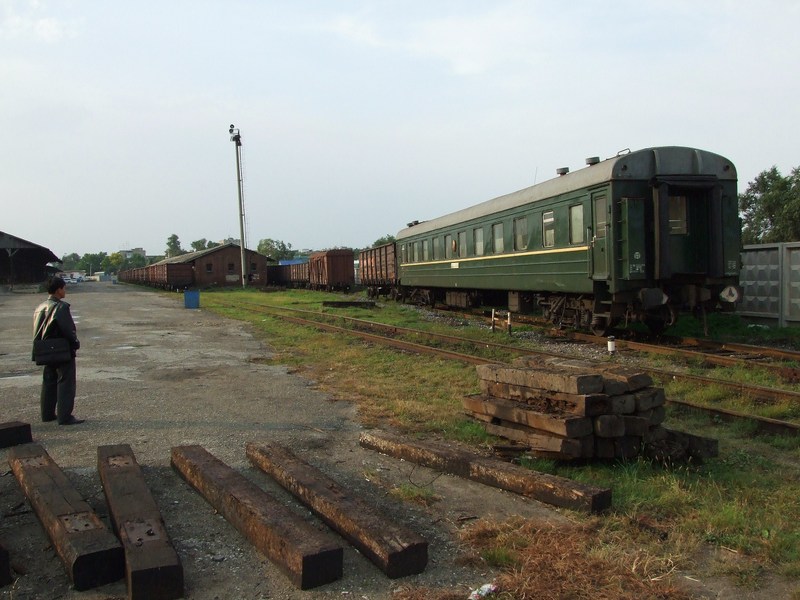
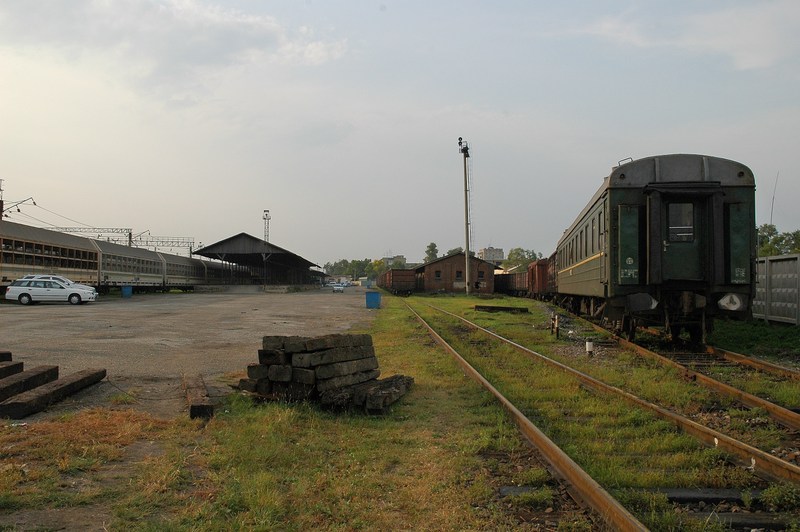 Custom control zone
Custom control zone
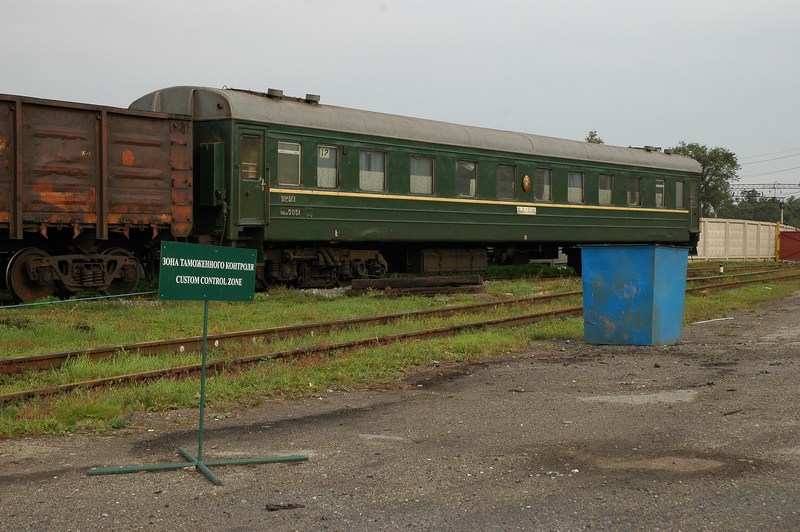
We also wondered where the westbound Korean sleeping car was parked. According to the timetable the Pyongyang – Moscow sleeping car is due to be in Ussuriysk on the same dates (4th and 18th of each month) as the Moscow – Pyongyang sleeping car: It should arrive from Pyongyang at 0:50 (7:50 local time) and depart at 17:12 (0:12 local time) attached to train no. 1 "Rossiya" (Vladivostok – Moskva).
We asked our conductors in which direction the station was located, then told them that we want to explore the station and the town and that we would would return only after some hours. We left our luggage inside the compartment. Also the other passengers and some of the conductors seem to have gone away – maybe the enjoy their last day in freedom…
It was quite warm and due to the humid air one could also feel, that the sea is not far away. We went to the end of the freight depot and left it at a gate. There were some Russian officials, but nobody was interested, what we were doing here. Then we were on a road on which we walked to the station. According to GoogleEarth it was about 650 meters (as the crow flies) south of our parked sleeping car:
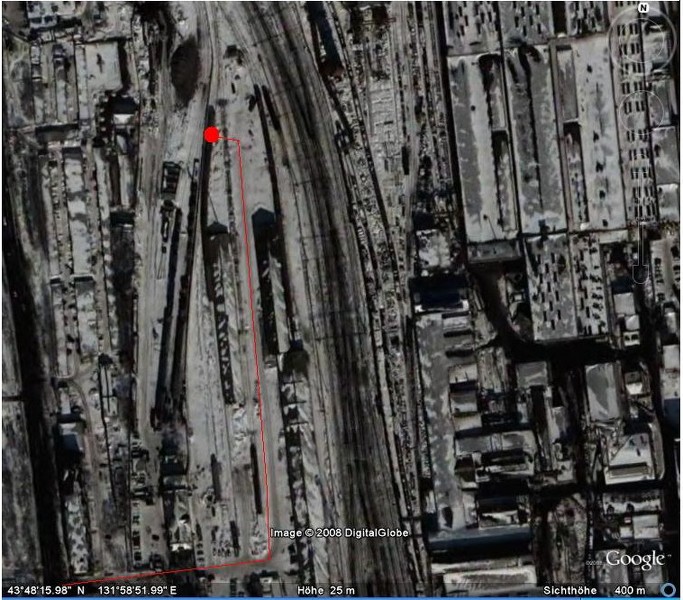
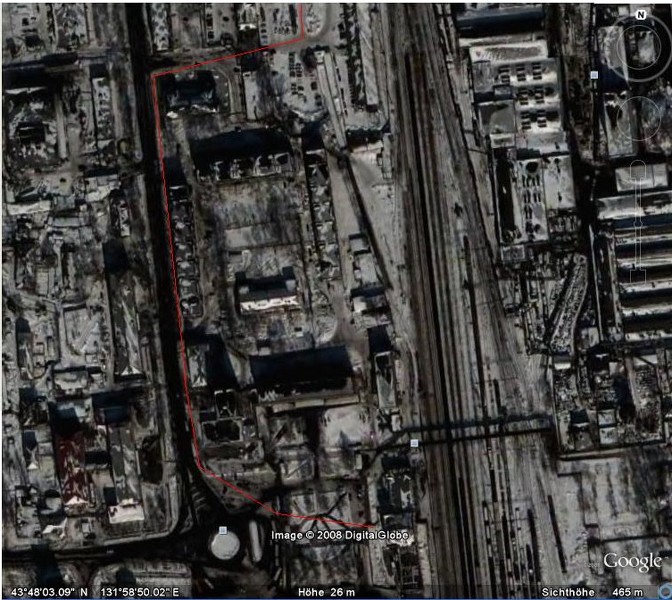
The station was currently under renovation. Train 351 (Sovetskaya Gavan – Vladivostok) just arrived:
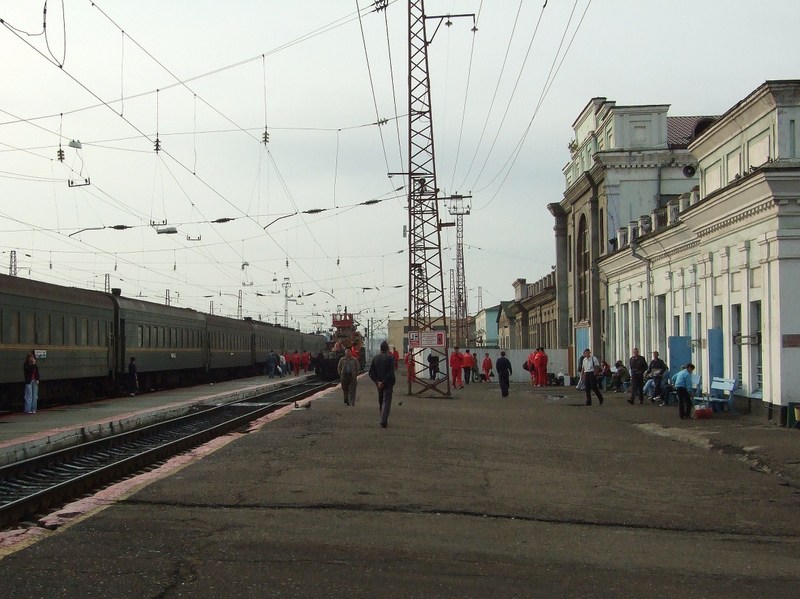
There was a pedestrian bridge over the rails, of course we had to go there to take some more photos...
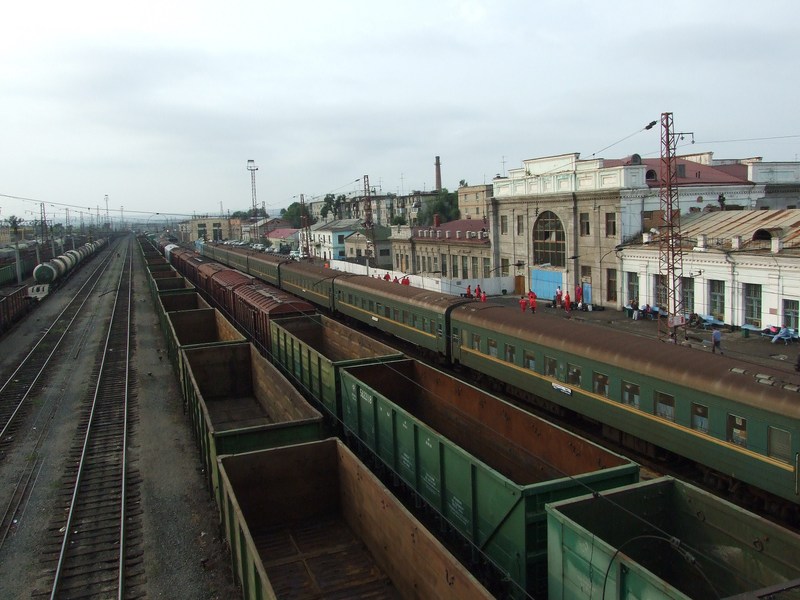
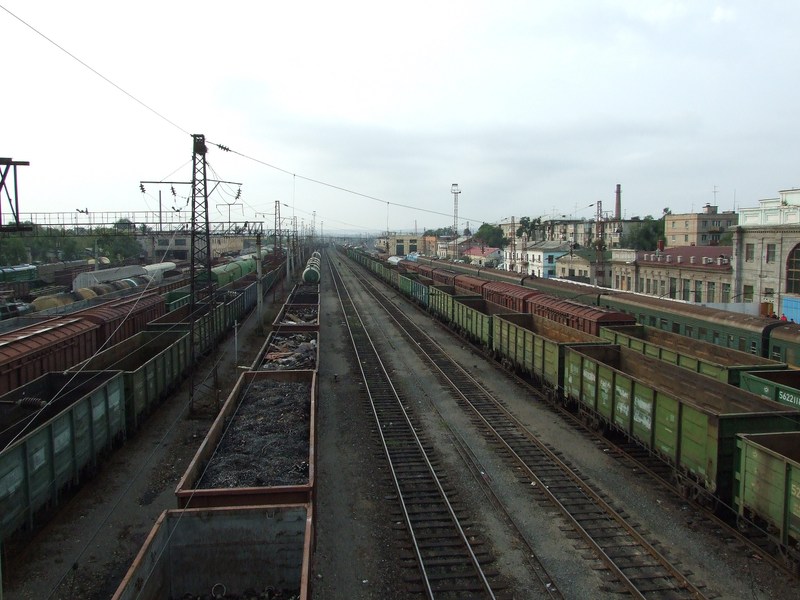
Modernized 3TE10 diesel locomotives:
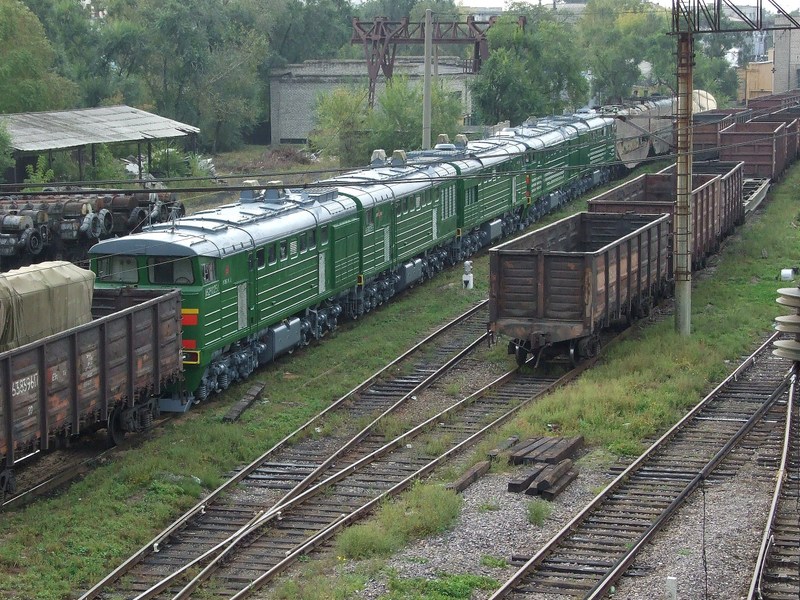
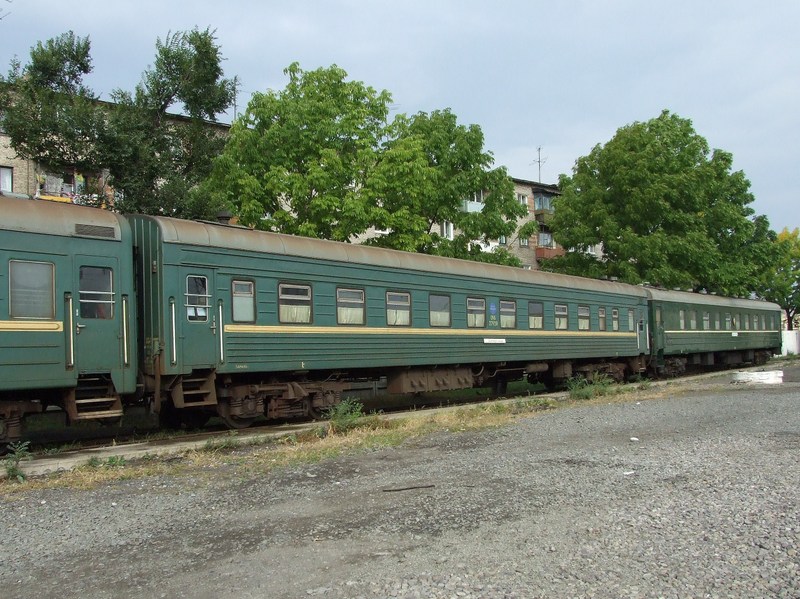 When I looked around, I suddenly noticed a wagon which already from the distance looked different than the others. I used the zoom-function of my camera to proof, what I suspected –and of course it was the sleeping car Pyongyang – Moscow…
When I looked around, I suddenly noticed a wagon which already from the distance looked different than the others. I used the zoom-function of my camera to proof, what I suspected –and of course it was the sleeping car Pyongyang – Moscow…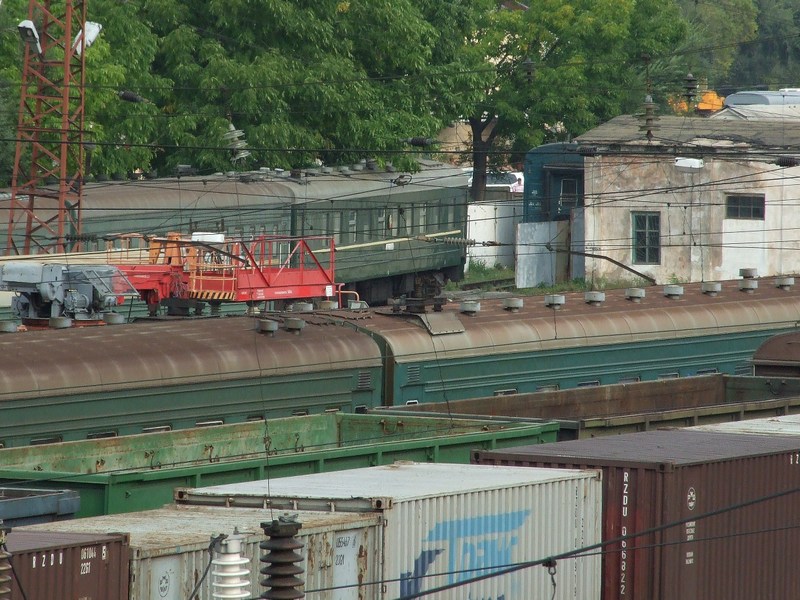
New electro-locomotive 3ES5K "Yermak" with a long freight train:
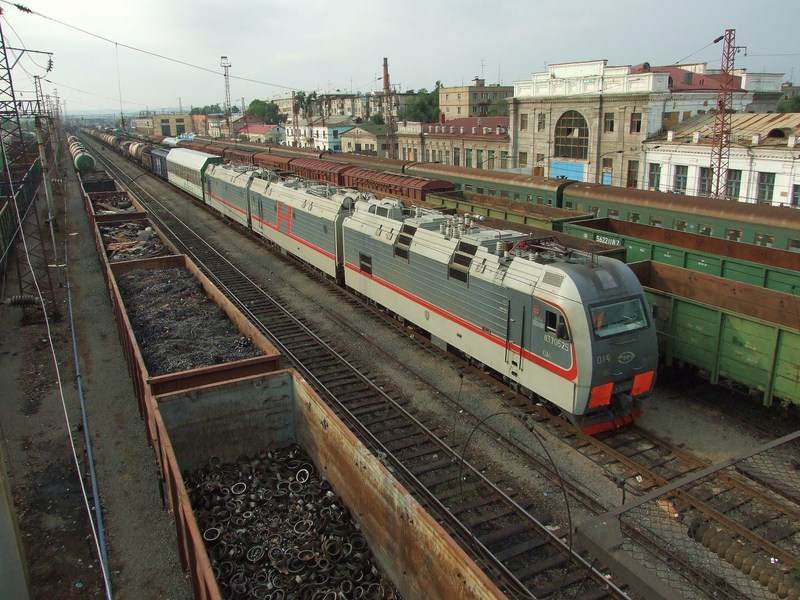
These locomotives are built by Transmashholding (http://eng.tmholding.ru/) since 2004, initially as 2ES5K, since 2007 with additional booster as 3ES5K. Power – 9840 kW, traction force – 696 kN (one hour rating).
More details are available here:
http://eng.tmholding.ru/work/catalog/products/682/683/685/1580
http://eng.tmholding.ru/work/catalog/products/682/683/685/2509
During my trip I noticed that new locomotives like the "Yermak" are becoming more and more common in Russia. Somewhere in the future they will replace the traditional Russian freight locomotives like VL10 and VL80...
Of course we had to inspect the train with the sleeping car Pyongyang – Moscow. Apart from the North Korean car the train Khasan – Ussuriysk consists of three Russian cars – one "plazkartniy" (dormitory-style beds), one "kupe" (4-bed-compartments) and one "obshchiy" (like plazkartniy, but used as seating car with 81 instead of 4 passengers):
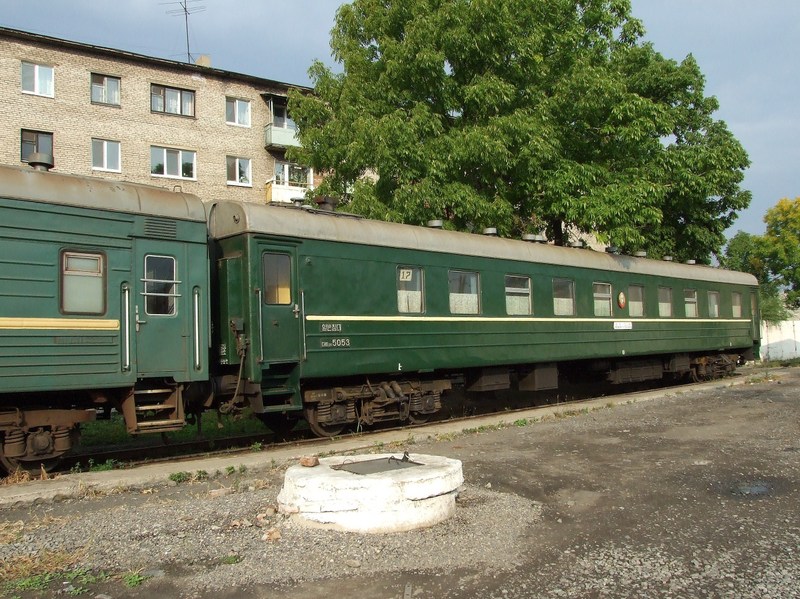
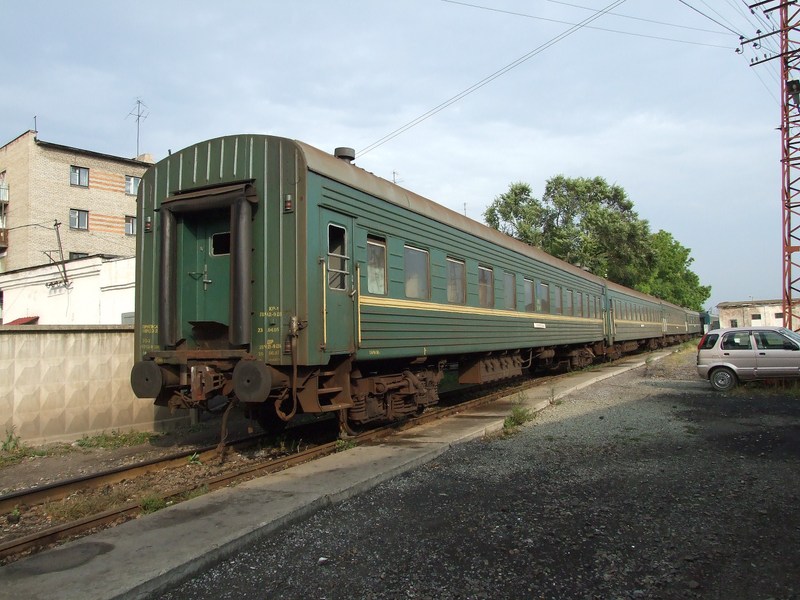
In front of the station:
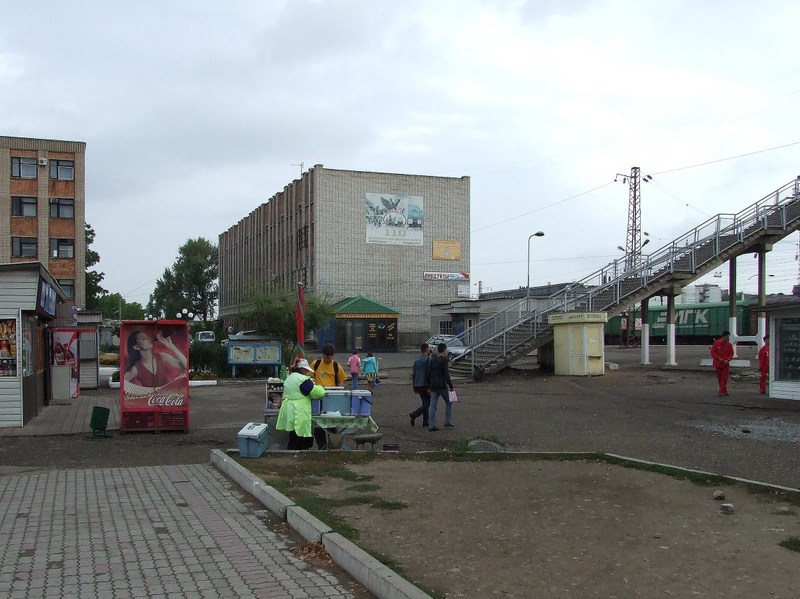
The men in red, which arrived with the train from Sovetskaya Gavan, were North Korean sportsmen…
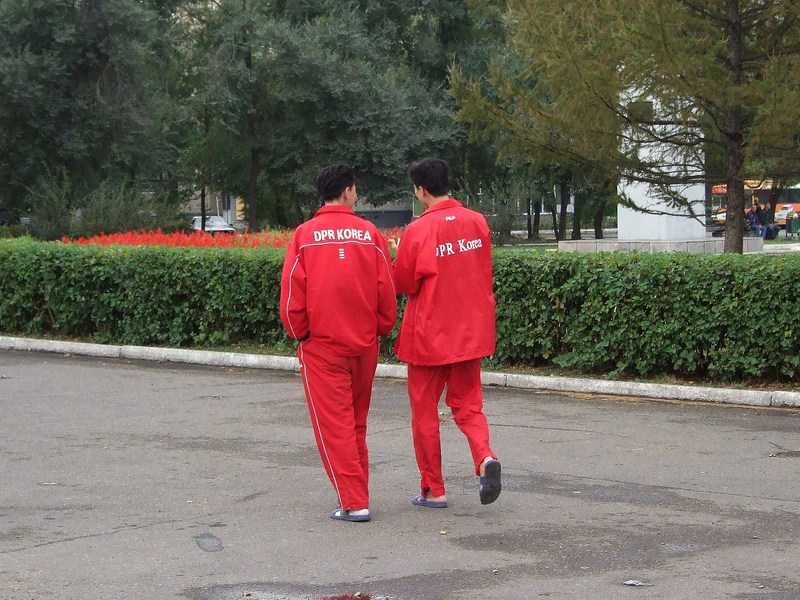
Good bye, Lenin – now we are going to Kim Il Sung and Kim Jong Il!
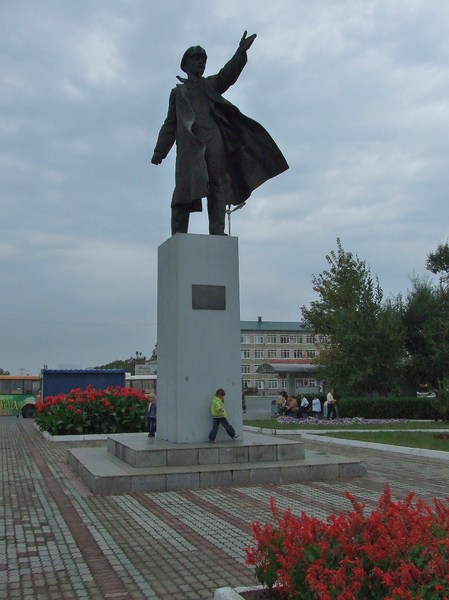
Advertisement of the "Primorskiy institute of railway transportation" offering education for railway professions:
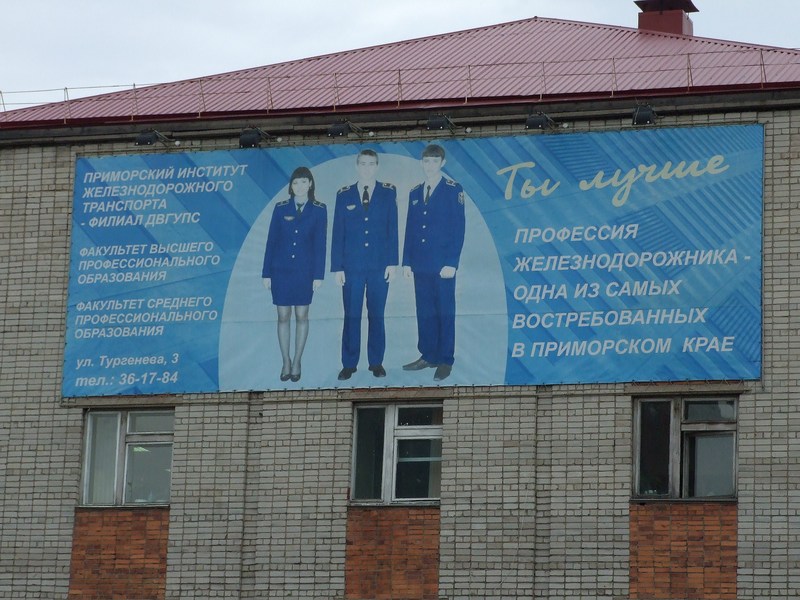
We asked how to get to downtown Ussuriysk, people told us to go by bus, as it is too far away to walk. At the bus stop we were quite surprised to find a detailed bus timetable listing all departure times of the urban busses.
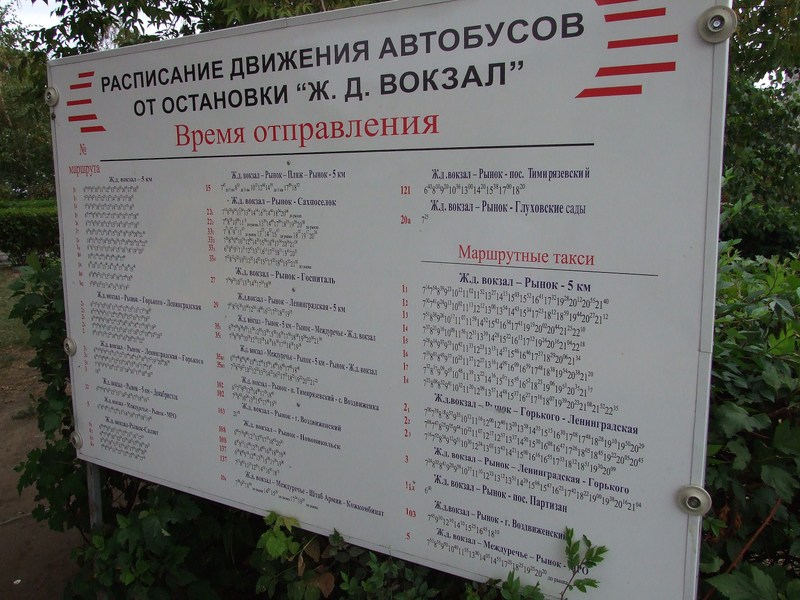
Later we found out, that such timetables don't only exist at the station, but at all other bus-stops, we saw. Such good passenger information is rare in Russia, and I wouldn't have expected it in a relatively small town in the Russian Far East! But progress happens!
Downtown Ussuriysk:
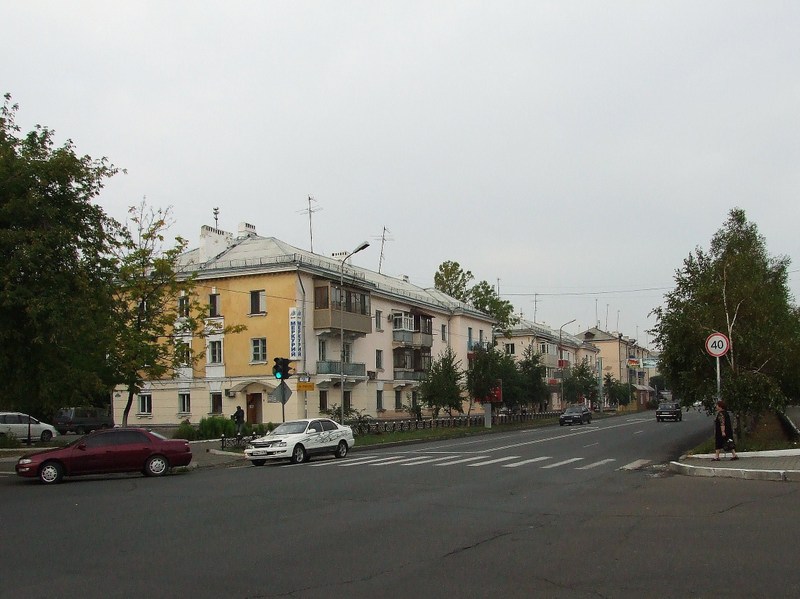
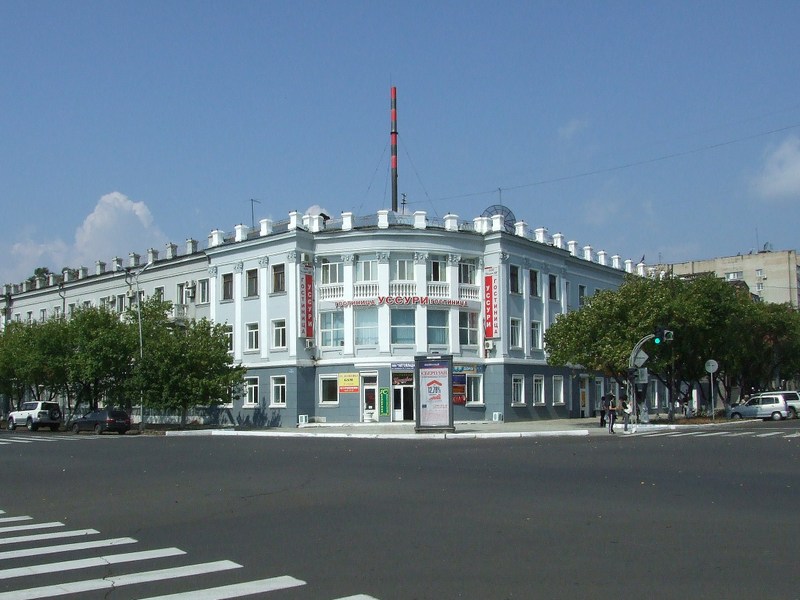 In general the town made a nice and very clean impression. Also there seemed to be a relatively wide selection of hotels, which is also unusual for provincial towns in Russia. I assume that the fact that China is not far (only 50 km to the border) boosts trade and economy in this part of Russia.
In general the town made a nice and very clean impression. Also there seemed to be a relatively wide selection of hotels, which is also unusual for provincial towns in Russia. I assume that the fact that China is not far (only 50 km to the border) boosts trade and economy in this part of Russia.More about Ussuriysk: http://en.wikipedia.org/wiki/Ussuriysk
After some shopping and a lunch at a small "shashlyk"-café we went back to the station:
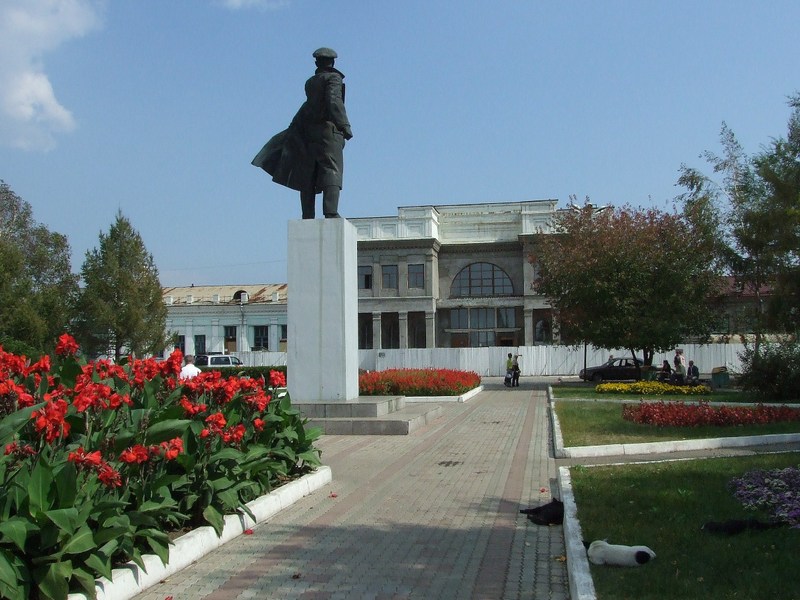
The North Korean sportsmen were still there. I asked them where they come from and where they go now and found out that they were a volleyball-team, which had a game in Khabarovsk and now return to Pyongyang.
Meanwhile our sleeping car had been shunted to the station and attached to the train from/to Khasan. So we didn't need to walk back.
Freight train with some new excavators:
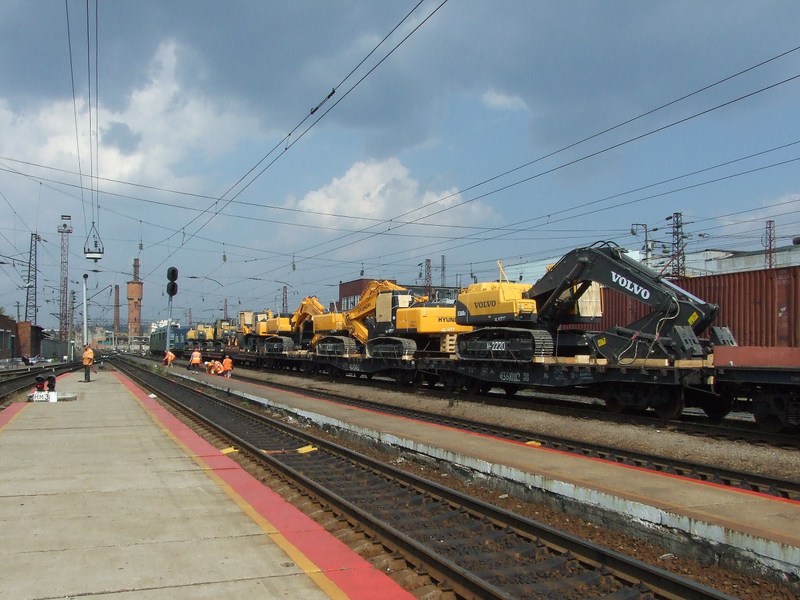
The safety marking on the platform was painted new:
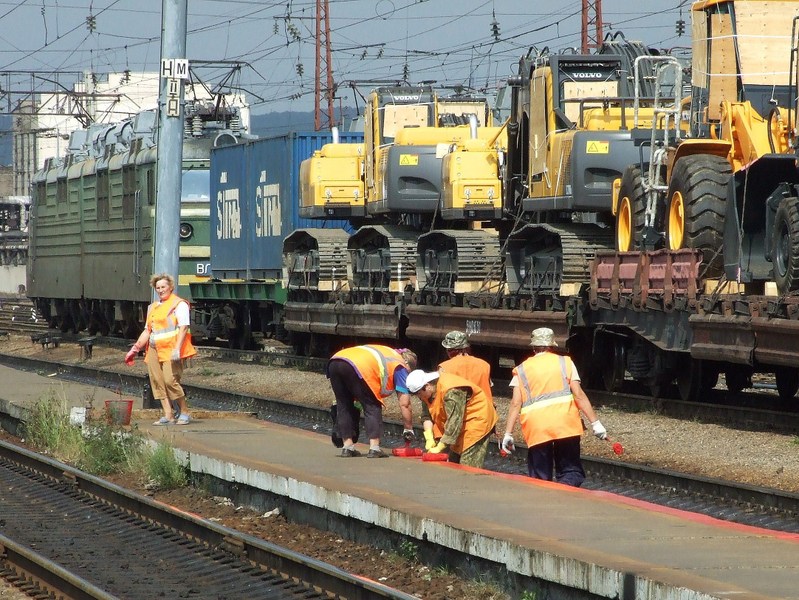
Woman with her mail-trolley, waiting for the luggage/mail-train:

Luggage/mail-train 903 from Vladivostok to Moscow:
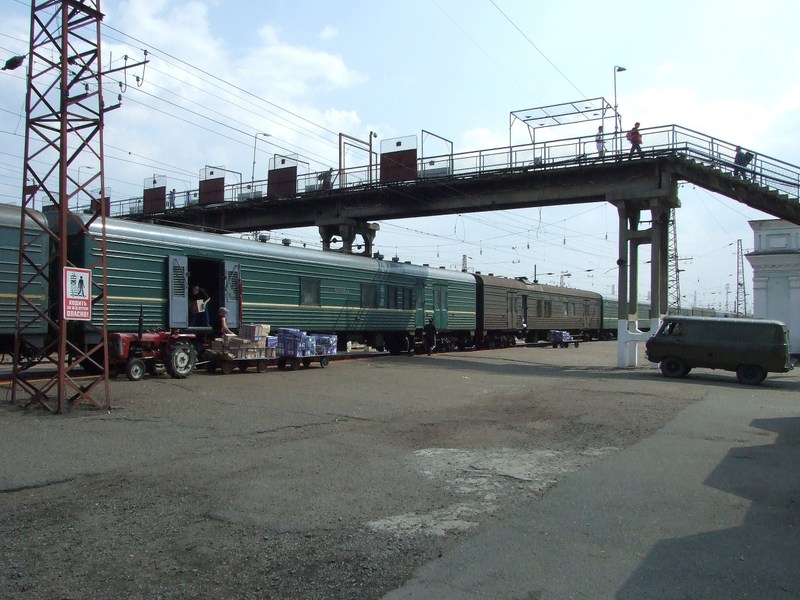
While we were taking photos, two policemen approached us. However, they just wanted to see my passport and asked what we were doing here. I explained that we are going to Korea and that we are railway employees in Europe and are just interested in the railway in Russia. I asked whether it's forbidden to take photos here, the answer was no, they were just interested why we take photos. So, everything was OK, and the two friendly policemen went away.
At 15:35 (local time) a TEM2 shunter came to the train to Khasan and pulled the 4 cars to the platform. The Korean sleeping car TO Moscow of course remained at the end of the siding.
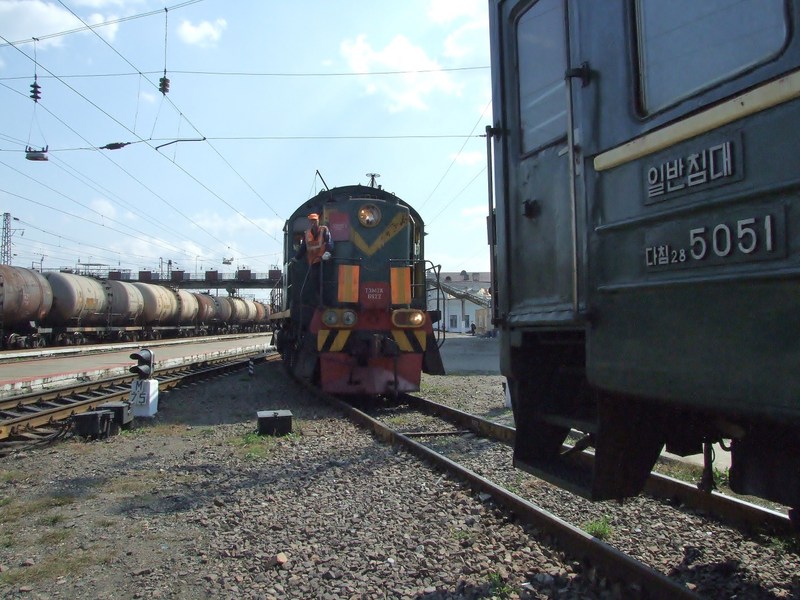
The train at the platform:
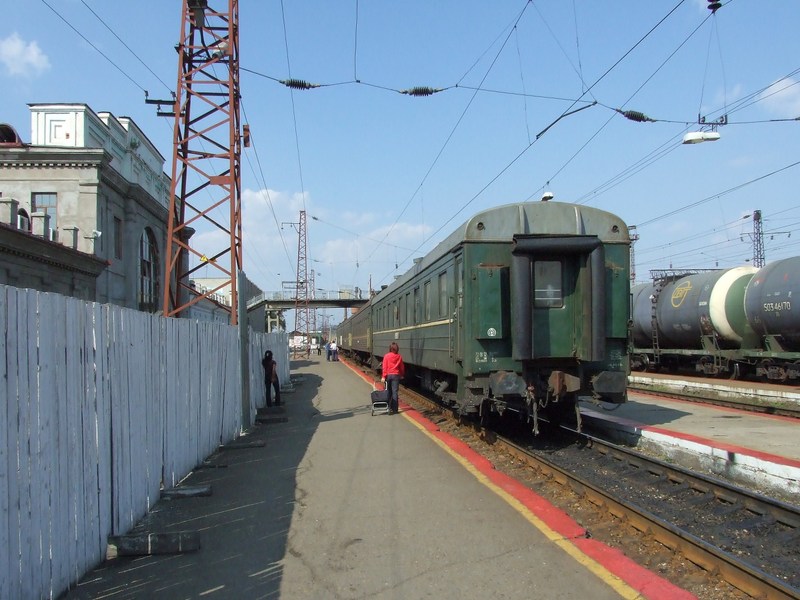
That's me:
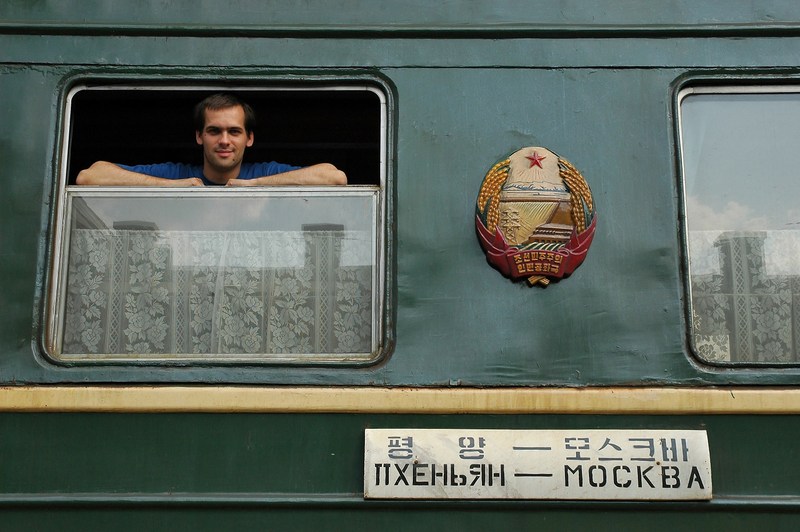
2TE10MK-1278 was attached to the train:
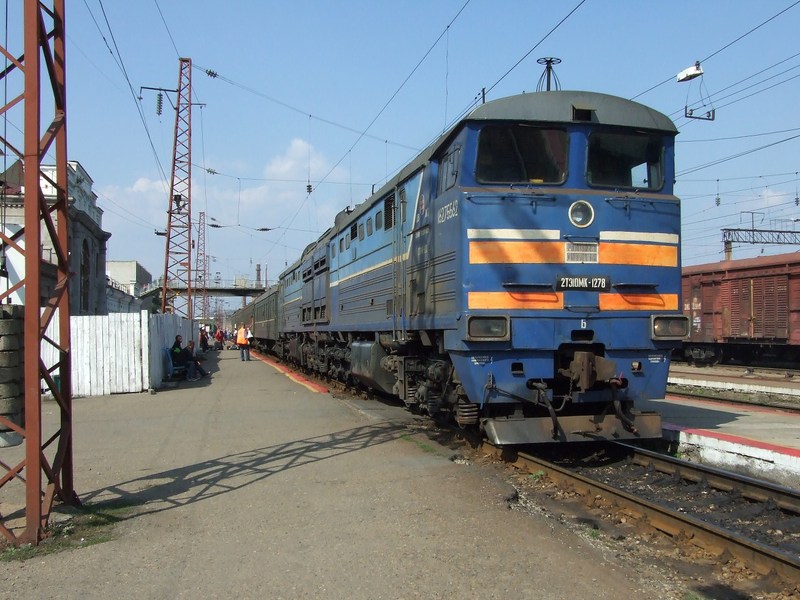
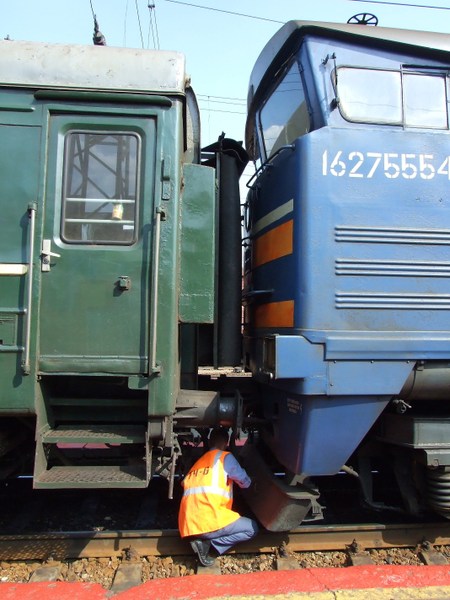
The Korean sportsmen boarded the "obshchiy"-car:
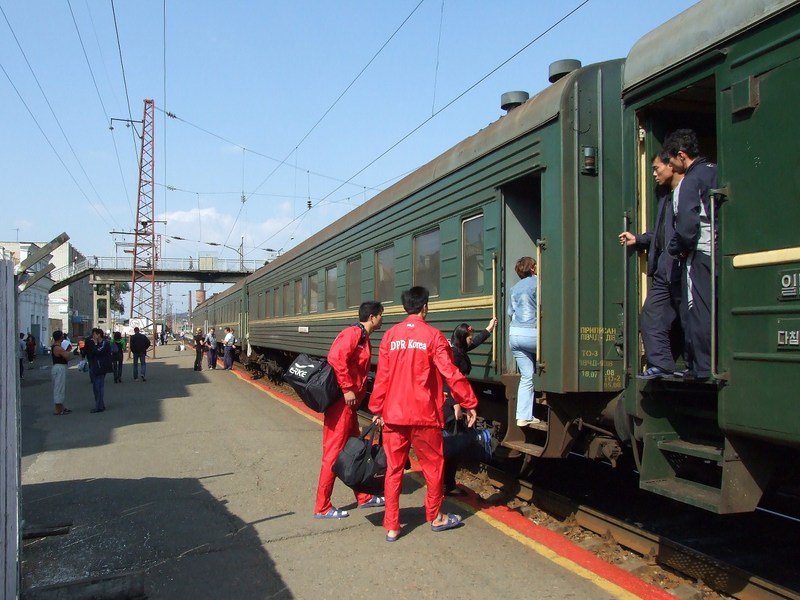
Punctually at 9:05 (16:05 local time) train 966 left. The train uses the Transsiberian main line along the Razdol'naya river for the first kilometres…
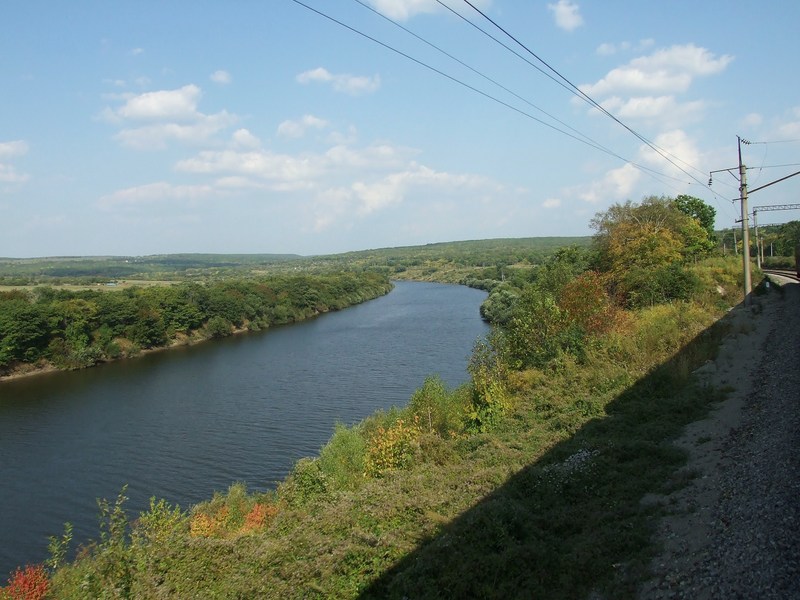
…before it branches off at Baranovskiy and crosses the Razdol'naya river:
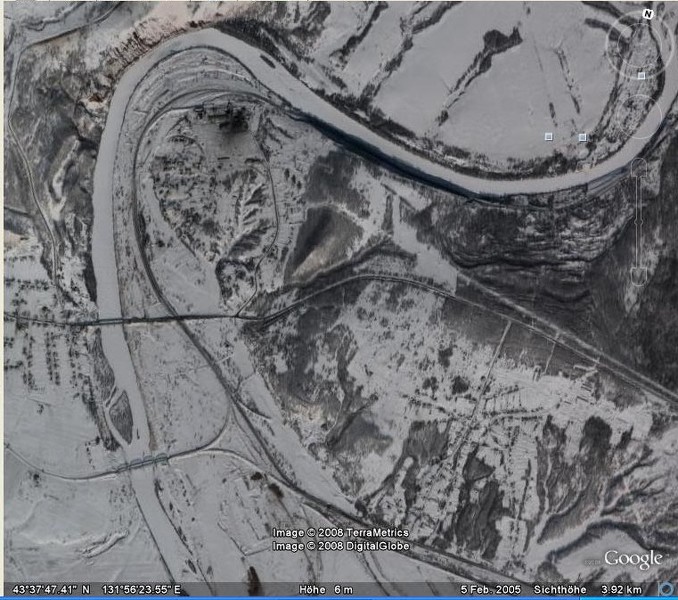
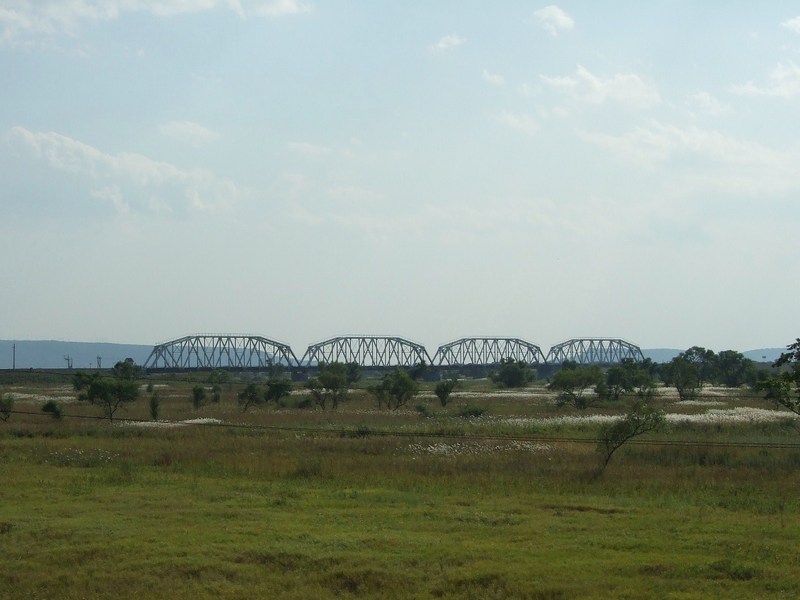
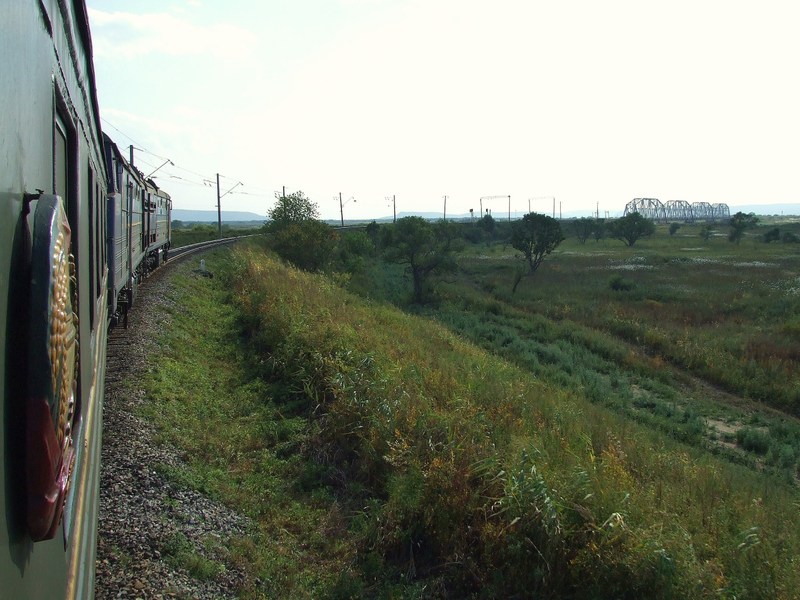
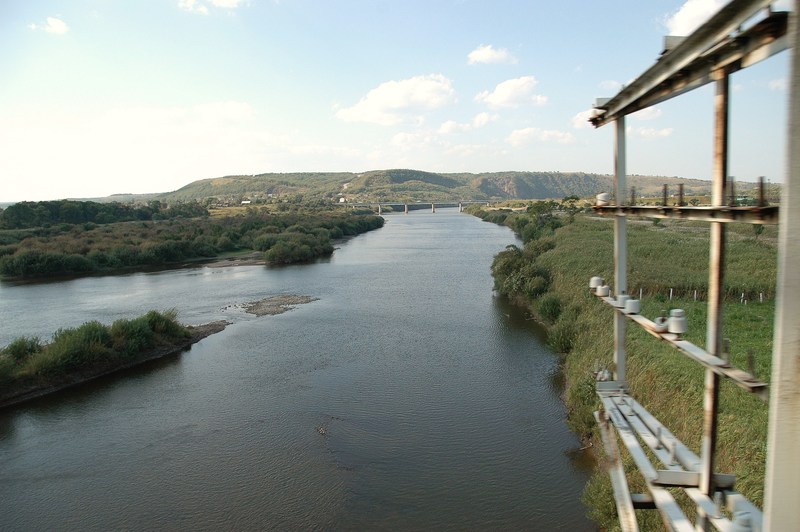
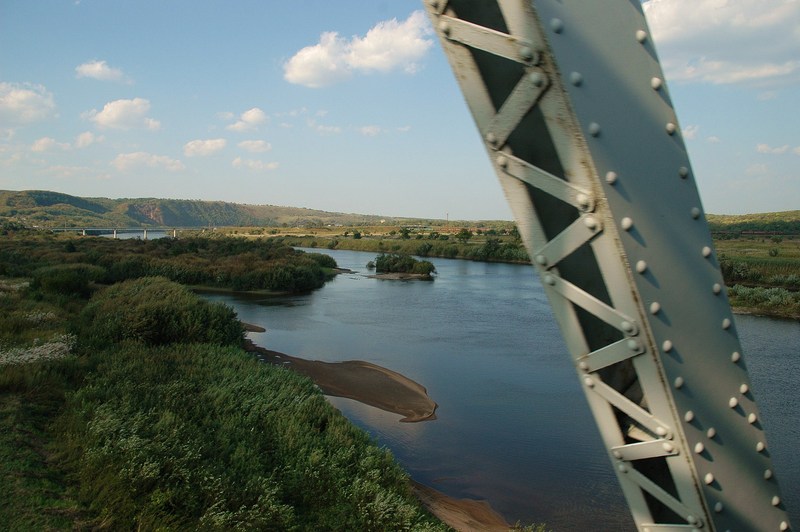
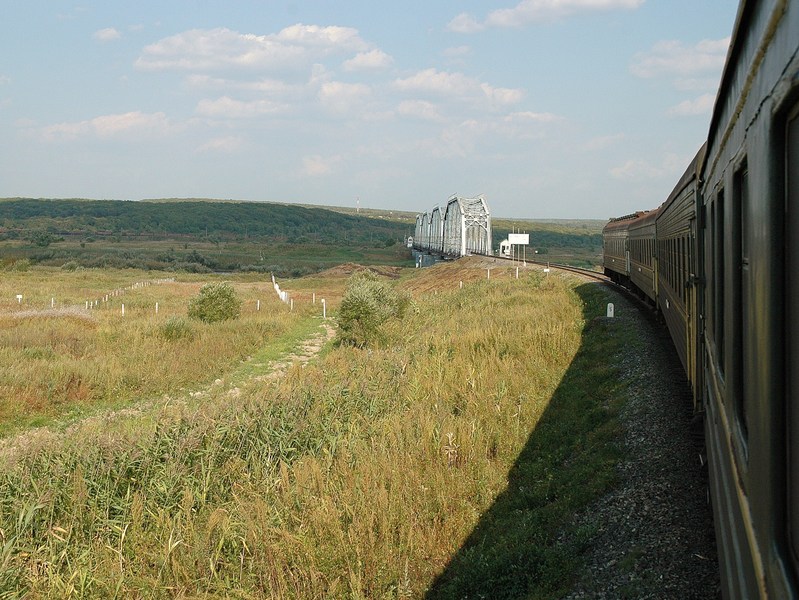
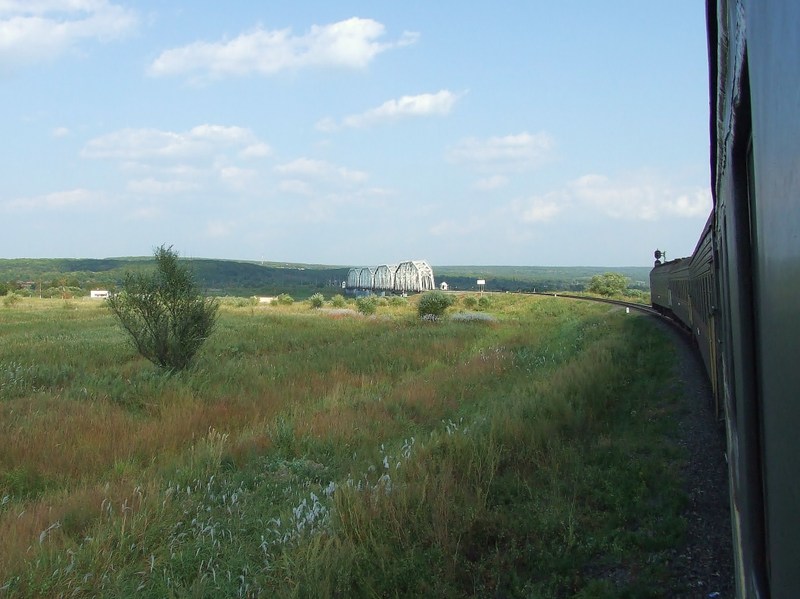
So, now we were already leaving the usual tourist-routes – North Korea, we are coming!!!
The speed on this branch line is also slower than on the main line and the train stops more often. The 260km-trip from Ussuriysk to Khasan therefore takes 7 hours…
Two hours after leaving Ussuriysk I saw the Pacific Ocean for the first time in my life:
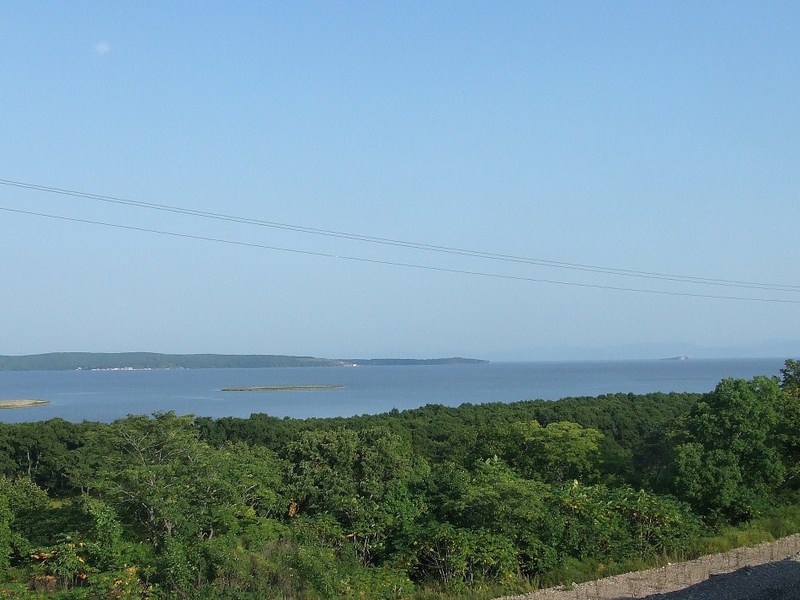
In the background Vladivostok could be seen:
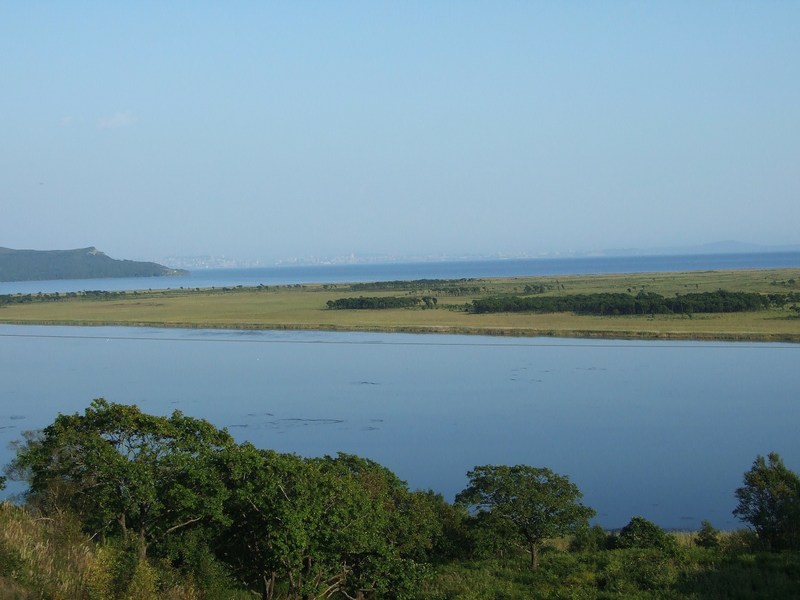
Station Primorskaya:
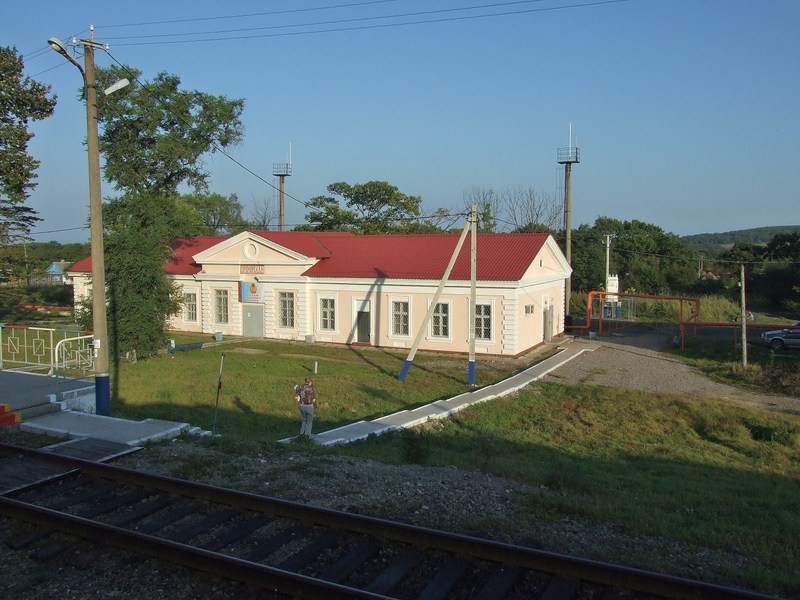
Train 965/966 is the only passenger train on this route, but we saw quite a lot freight trains at the stations we passed.
The landscape here is beautiful and nature seems untouched. And the whole area seems quite unsettled.
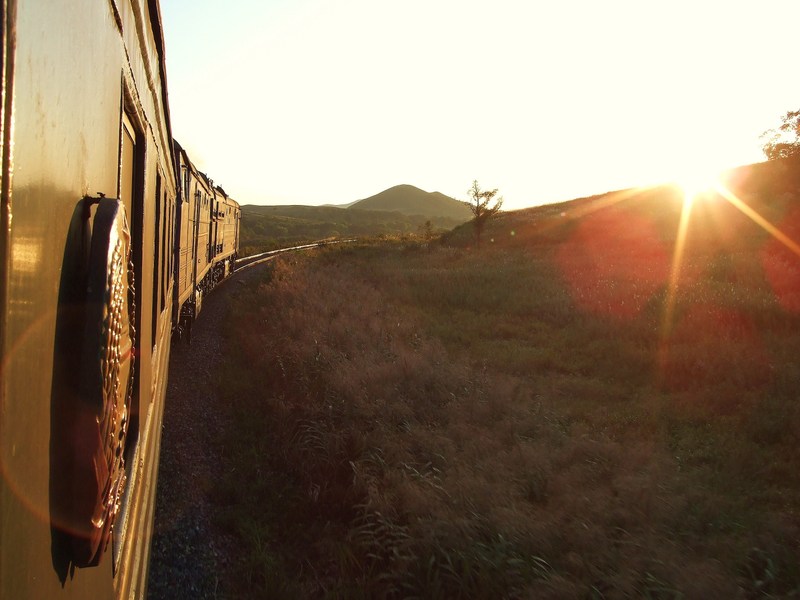
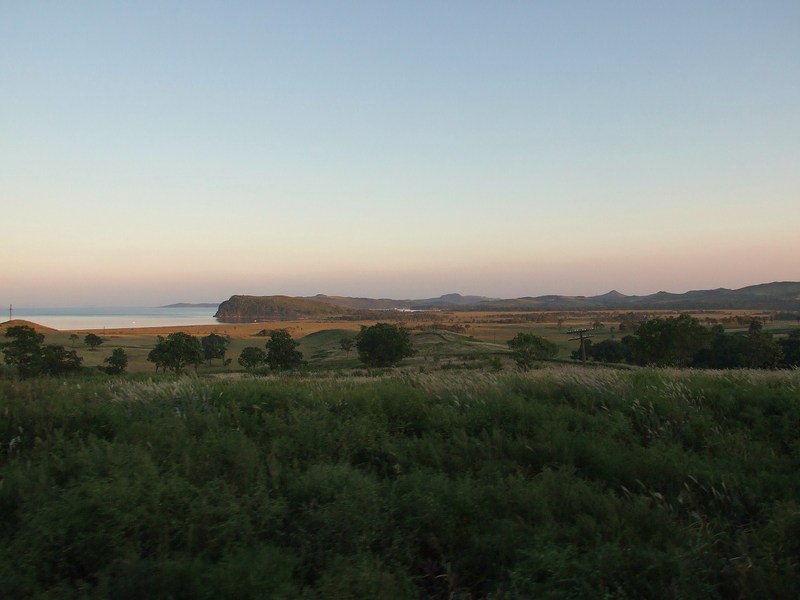
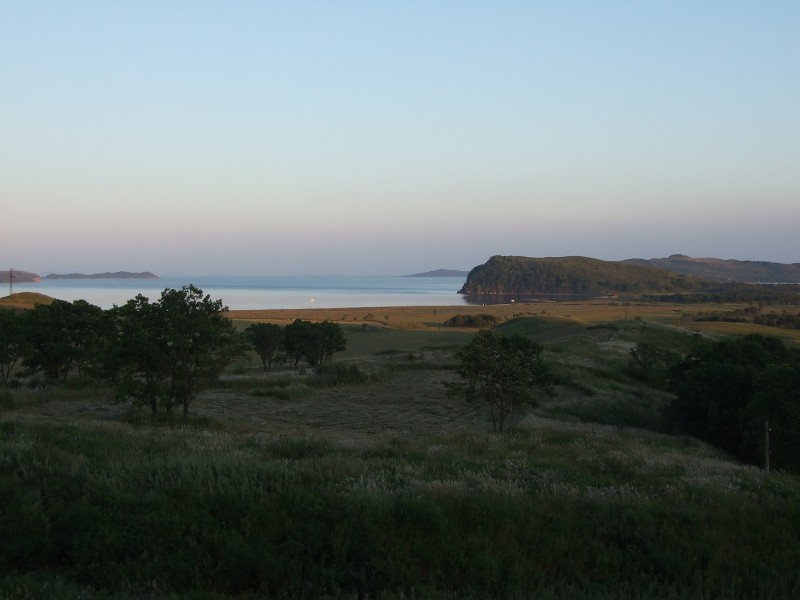
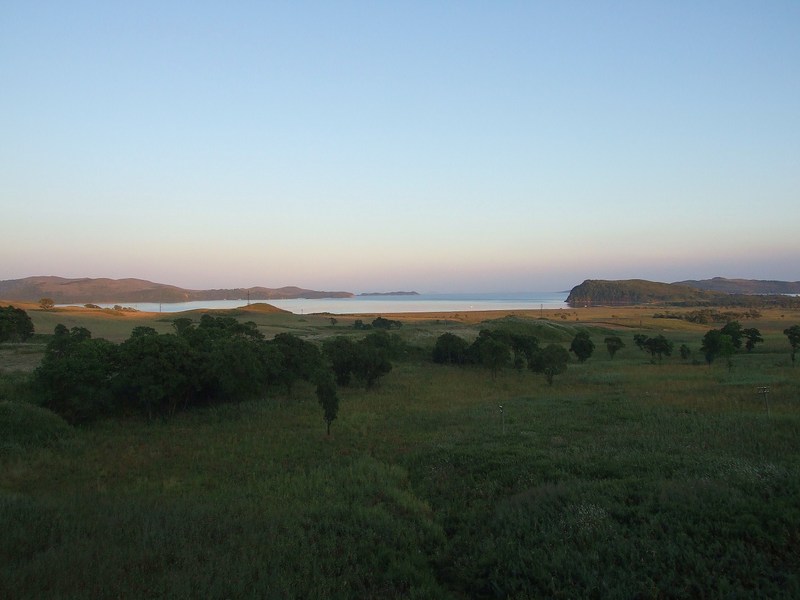
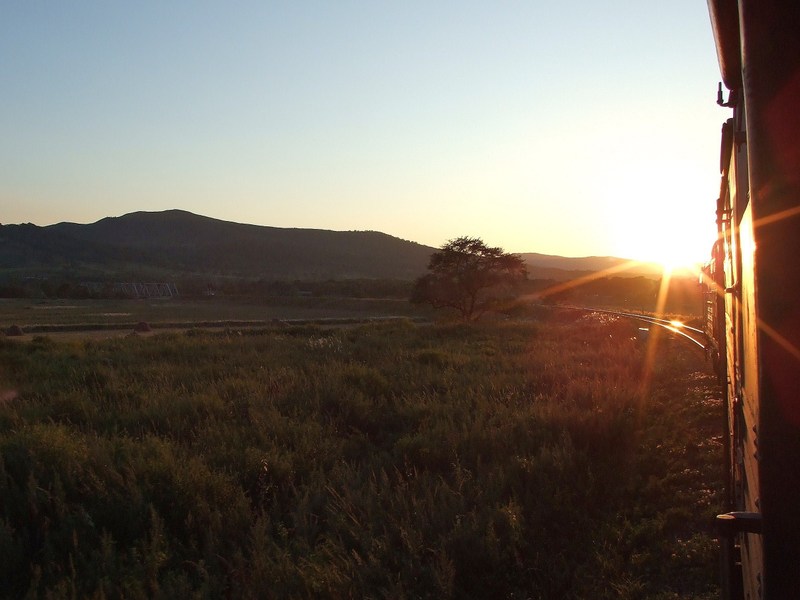
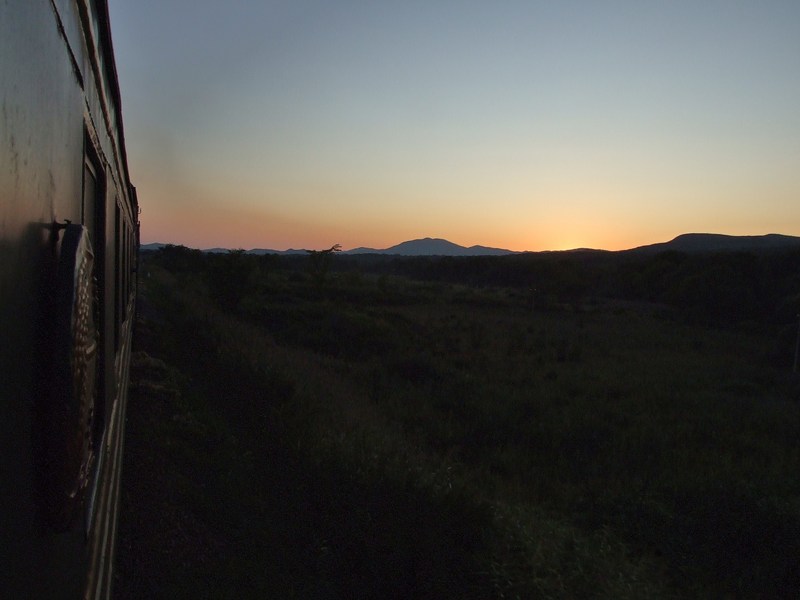
Sunset was at about 20:15. Three more hours in the darkness till Khasan, the last Russian village before the border to the mysterious "Hermit Kingdom"…
Finally at about 23:00 (local time) the train arrived at Khasan. There were only a few passengers getting off. The station building was brightly illuminated. It's a strange, quiet atmosphere at an interesting place. It's not only the fact, that North Korea is only 1600 meters away. Also China is very close.
Russia and North Korea only have a 17-km long common border along the Tumen-river. Only a railway bridge, the so-called "friendship-bridge", opened on 9th august 1959, crosses the border. The point, where Russia, China and North Korea meet, is only 200 or 300 meters west of the bridge in the middle of the river ...

A Soviet military map (1:100.000) of the area:
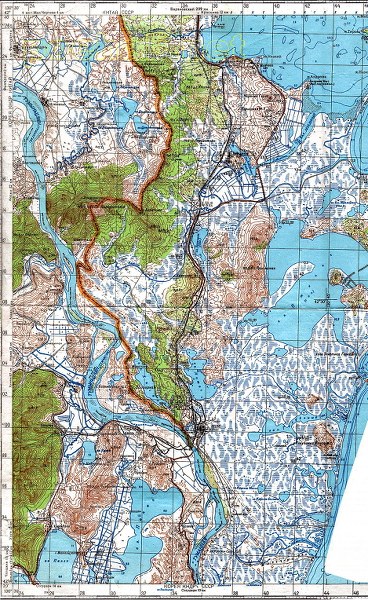
So, it's quite an exciting place in a geopolitical sense...
See for more maps at http://imageshack.com/a/img921/1224/dV64Py.gif (scale 1:200.000, please note the remark "secret") and http://imageshack.com/a/img921/4070/5D4JKj.gif (scale 1:500.000). There is no legal way to cross the Russian-Chinese border near Khasan, so it is indeed an very isolated village.
Shortly after arrival a female Russian railway employee came to the Korean sleeping car, together with an – obviously – Korean men. They sat down in the conductors compartment.
After some time we were called to come there. Together with the conductors they were filling out a list with all passengers, who would cross the border the next day. The Korean man seemed to be a translator, he spoke fluently Russian and Korean. All were very friendly.
However, they were quite surprised to meet Austrian and Swiss citizen. They wanted to see our passports and asked whether we have documents to enter the Democratic People's Republic of Korea. We answered that we have valid DPRK-visas and showed them in the passport. They were content with it and wrote our names and passport details on the list...
The woman said, that we can now walk around at the station, but that taking photos is not allowed.
So we left the train. The Korean sportsmen were sitting on the stairs from the platform to the station building. There were several video-cameras, so taking photos was indeed out of the question.
Most of the station building was dark. Only the most northern part was accessible, the other doors were closed. We entered the station building. Inside there were some waiting benches, a ticket counter and a police office. There were also some people – the train back to Ussuriysk leaves at about 1:00 (local time) in the night.
The timetable listed – beside the train from/to Ussuriysk – also two so-called "working trains" (rabochnye poezda) to/from Gvozdevo, maybe better translated as mixed trains. Trains over the border were not listed, but I knew that there is not only the twice-monthly sleeping car Moscow – Pyongyang, but also a twice-weekly cross-border passenger train Khasan – Tumangan.
While we were looking around, a policeman came out of his offices. He asked us for our passports and what we were doing here. We answered that we were going to Pyongyang.
I should tell, that access to border areas in Russia is limited and usually requires a special permit. No permits are of course required for people living in this area and for those who are only in transit – like we...
The policeman was satisfied with our explanation. I asked him, whether and how often he met foreigners here. He said, that he has been working here for about one year and that we were the 1st foreigners (except North Koreans, of course), he met.
We went back to the sleeping-car. The woman and the Korean translator just left the sleeping car. I also asked them about other third country citizen crossing the border. The answer was that usually only Russian and Korean citizen cross the border, but that there have been a few third country citizen here, but they didn't remember when that was the last time...
They also said, that among the passengers of the sleeping car to Pyongyang there are usually not even Russian citizen. Russian citizen crossing the border only go to the so called "Rajin-Sonbong Special Economic zone", setup by the North Korean administration in cooperation with China and Russia. See http://en.wikipedia.org/wiki/Rajin-Sonbong_Economic_Special_Zone
There are travel agencies organizing trips to sea-resorts in this zone. See http://alfa-i-omega.com/severnaya-koreya/ (Russian travel agency offering trips) and http://blogion.ru/fomenko/2008/07/17/o-tom-kak-my-pobyvali-v-severnojj-koree/ (Russian travelogue).
We went back to our compartment. Meanwhile the platform was empty, the Korean sportsmen disappeared somewhere. The train back to Ussuriysk had already left, it was totally quiet. Now we are really at the end of the world, or at least of the world, too which we are used…
Now I could take two photos out of the train window:
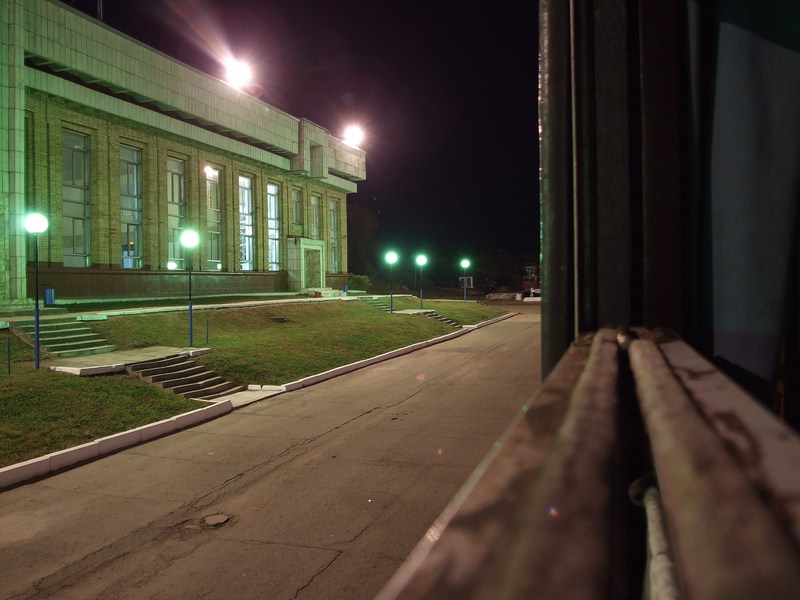
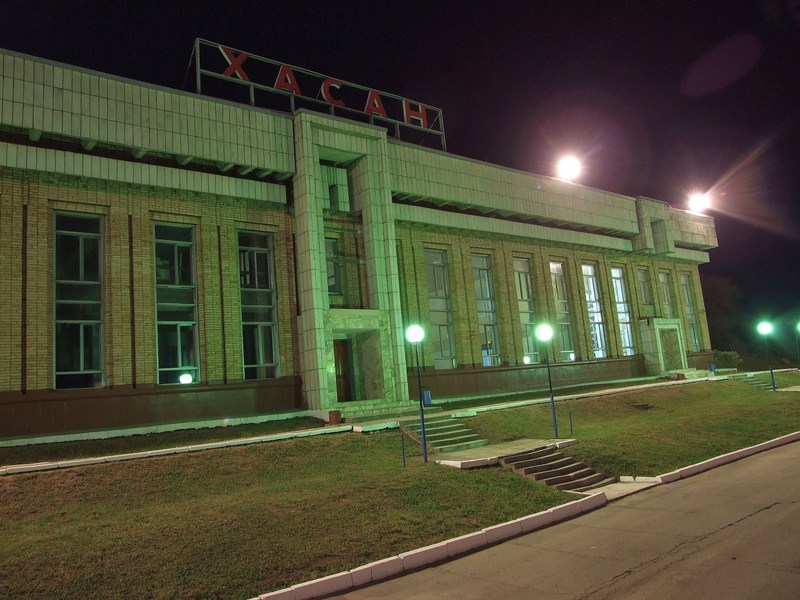
After some time we decided to went to bed. There was just one problem – I needed a toilet, but the toilet in the car was locked, as were the doors of the car. However, the front doors of the car were not locked, so also this problem was solved…
2008-09-19
We woke up at around 8 in the morning. Today the "songun-era" begins, we were joking… After breakfast we left the sleeping car for a walk on the platform. The sleeping car was standing alone on track 1. Track 2, 3 and 4 were empty, on the other tracks there were some freight cars. But they were already out of service and waited for better times. We also noticed one track with 4 rails – Russian broad gauge (1520mm) and Korean standard gauge (1435mm). But the standard gauge rails seemed to be unused. This station had already seen better times with more traffic…
The only activity were some workers removing grass growing between the rails.
At about 9:00 the mixed train from Gvozdevo arrived on track 3. It was pulled by a TEM2 and consisted of one "obshchiy"-car and some freight cars. We saw no passengers leaving it.
From the distance we took this photo of the station:
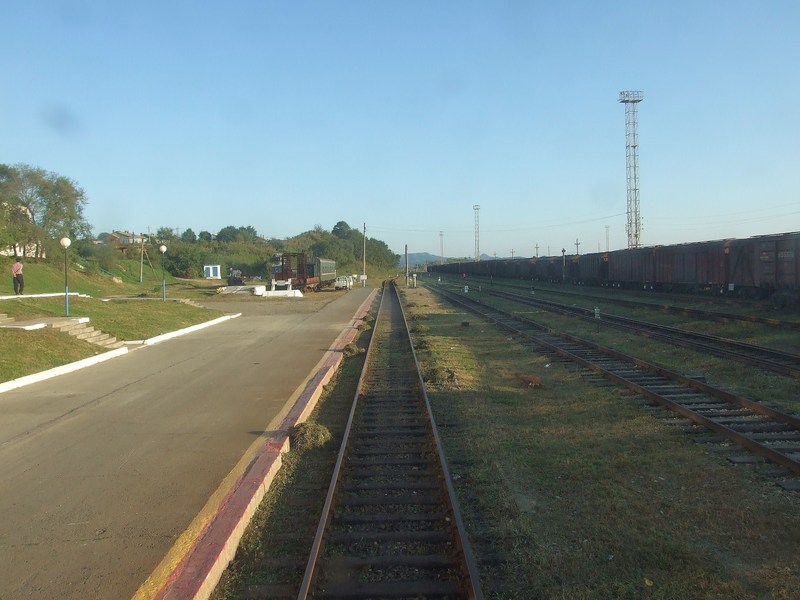
We went back to the wagon. After some time a Russian man in civilian clothes came and collected our passports. He then disappeared in the station building.
Alltough we bought some bread at Ussuriysk, we now thought that it might not be enough for the further trip to Pyongyang. So I asked some Russians for a shop. It was close to the station on the main-road of the village.
After some time the man returned to us. He asked me for my Russian registration stamp on the immigration card (which I received when I entered Russia). I explained that I have only travelled across Russia without long stops and showed him the entry-stamp of Bryansk.
He gave us our passports. It seemed as this was not the real, final passport check, as we also received our immigration cards back. They have been stamped, but the passport wasn't.
After that I could take two more photos out of the wagon:
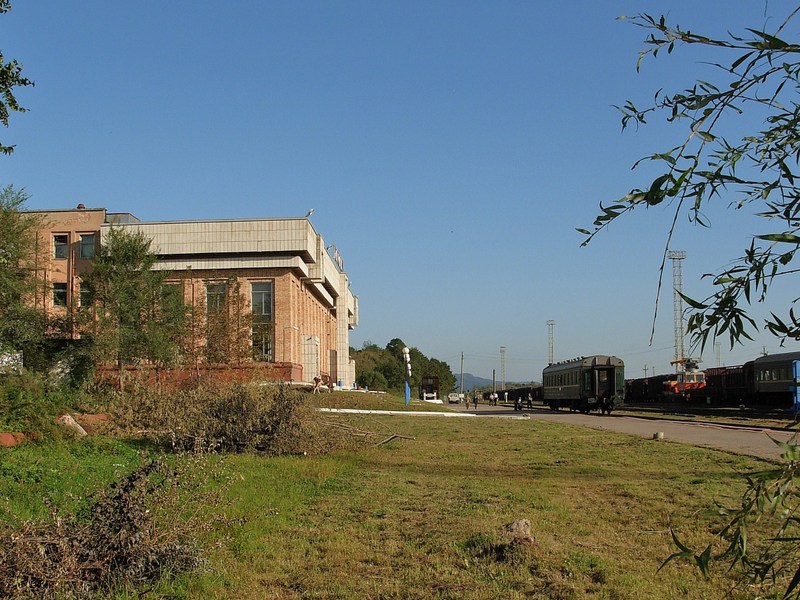
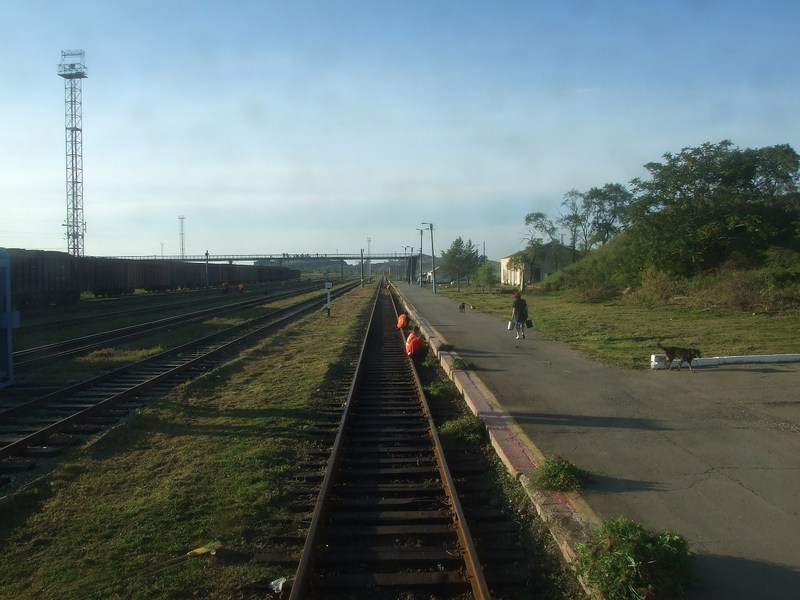
At about 10:15 the real border check began. Uniformed men and women entered the sleeping car. They again took our passports with them.
After some time the customs official came. We had just to answer the usual questions regarding alcohol and cigarettes, whereas the Korean conductors and passengers had to open all their packages. I don't know whether they had to pay a fine, but I assume that also the customs officials get their share of the profit generated by this kind of trade…
Then another soldier came, he removed all kind of coverings and also the backrests of the beds to check whether there is something hided behind...
After about one hour the passports were returned to us. With the exit-stamp in our passport we passed the "point of no return"…
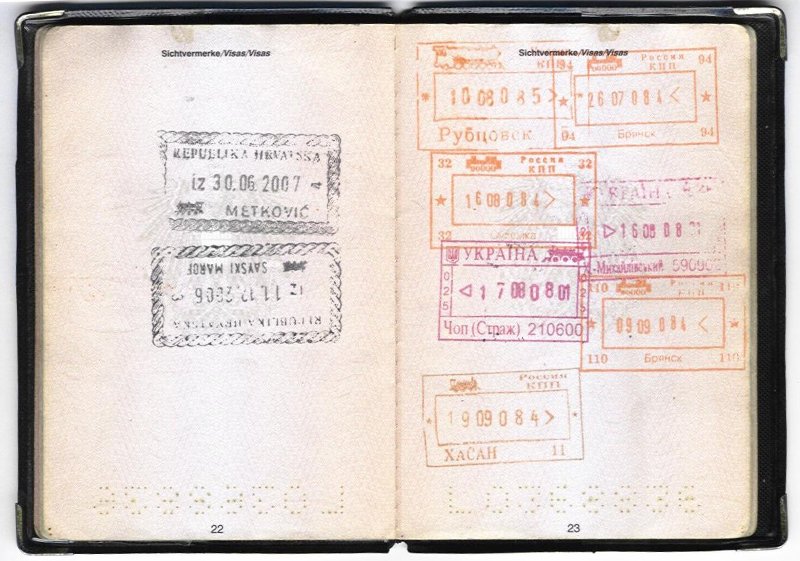
Already the Khasan-stamp was a trophy for us, let's see whether we will get something more interesting…
The scheduled departure time was at 12:00 (5:00 Moscow time). Still nearly one hour. The TEM2-locomotive of the train from Gvozdevo moved to track 1 together with the "obshchiy"-car and these two vehicles were coupled to our sleeping-car to form the cross-border train.
Soldiers surrounded the small train and the rest of the platform was fenced off with barrier tapes.
Then one of the doors (which had been closed the evening before) of the station building opened and in intervals of about one minute about 15 Russian passengers for the "obshchiy"-car came out and went to the train. Apparently the southern part of the station building is used for passport and custom checks for other passengers than those of the direct sleeping car. After the Russian passengers also the Korean sportsmen (they were 17) came there one after each other and boarded the "obshchiy"-car.
Whereas all Russian citizen entered at the front-end, all Korean passengers entered at the rear-end of the wagon. And all passports were double-checked at the wagon-door by a Russian border official.
Finally, at about 11:50 all passengers seemed to be on-board. Some minutes later the engine started and a Russian soldier boarded our wagon at the rear-end. At about 12:05 we left Khasan station…a very exciting moment…
The distance from the station to the bridge is about 1,5 km. The train went slowly with about 30 km/h. The rails were surrounded by fences.
Just in front of the bridge there was a small platform and the train stopped here. The Russian soldiers left the train. There were some military buildings around – of course not a good place to take photos. However, at http://udaff.name/mir/zvukorezh_dvr/ I found a photo of the sign "Rossiya – KNDR" (KNDR = Koreyskaya Narodnaya Demokraticheskaya Respublika" = Democratic People's Republic Korea), which I have embedded to this Google-Earth image:
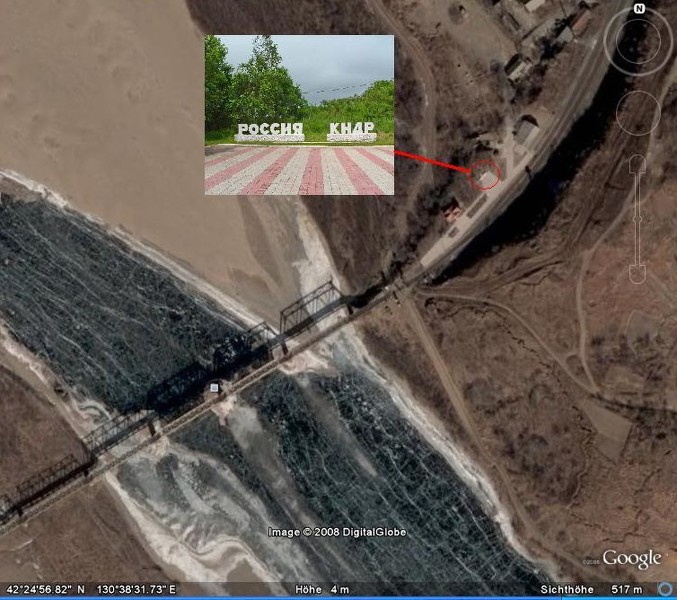
Also this photo of Kim Jong Ils special train was taken here:
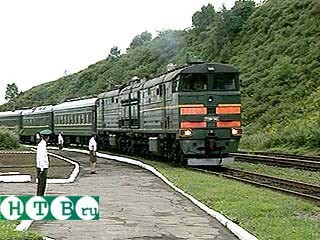
The bridge:
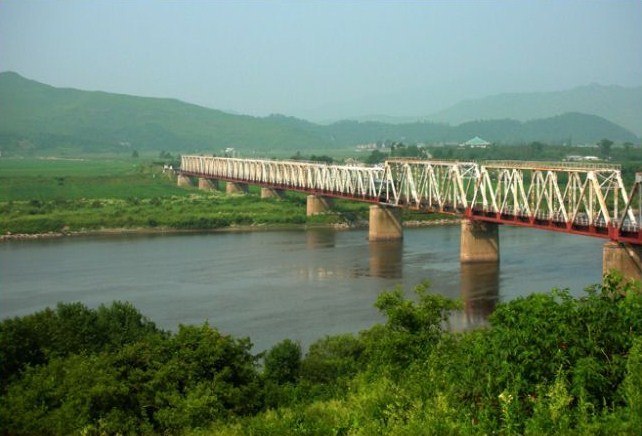
After a few minutes the train rolls on... we are approaching the "Friendship Bridge" to North Korea...
The gate, which can be seen on this photo, is now open...
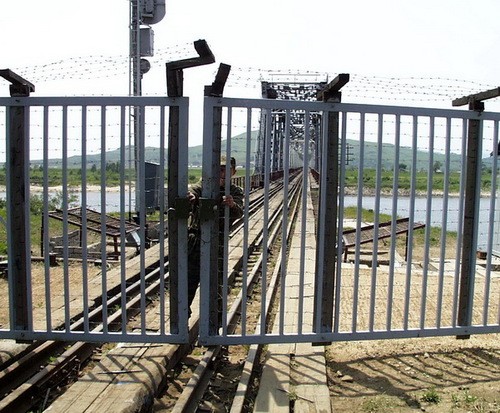
Slowly we run over the bridge... what will happen on the other end of it? How will the border guards react? Will there be problems? We don't know it really..
Some other interesting pics from http://forum.pogranichnik.ru/index.php/gallery/category/145-khasanskii-pogranichnyi-otriad-posetskii
Russian border guards handing over a poor North Korean refugee back to their North Korean colleagues:
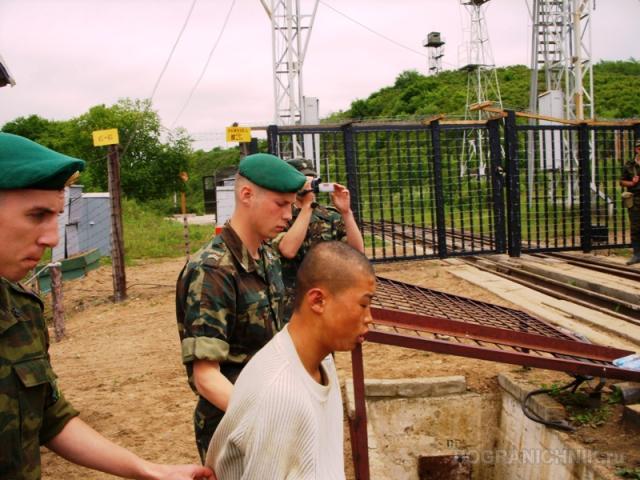
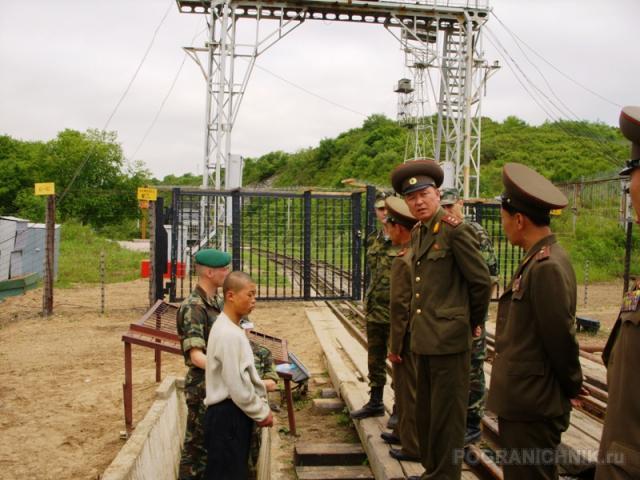
Source:
http://forum.pogranichnik.ru/index.php/gallery/image/10958-peredacha-grazhdanina-vostochnoi-natcionalnost
http://forum.pogranichnik.ru/index.php/gallery/image/10959-peredacha-ngg-khasanskii-pogo
I don't want to imagine what happened to him after being handed over to North Korea...
North Koreans on the bridge:
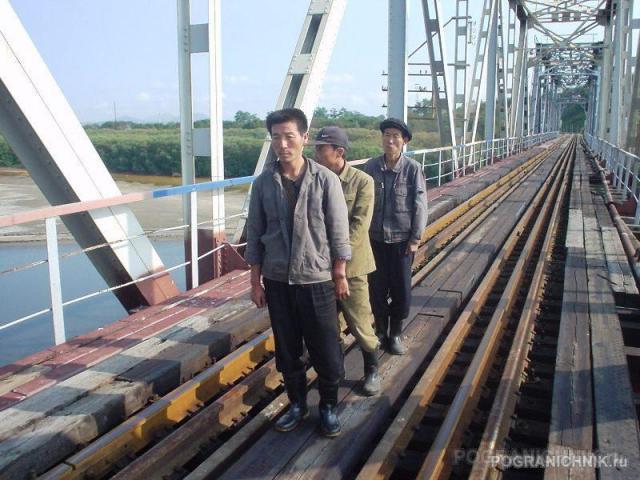

Source: http://forum.pogranichnik.ru/index.php/gallery/image/5409-khasanskii-pogo-kndr-zaderzhannye/
Bilateral meeting at the middle of the bridge:
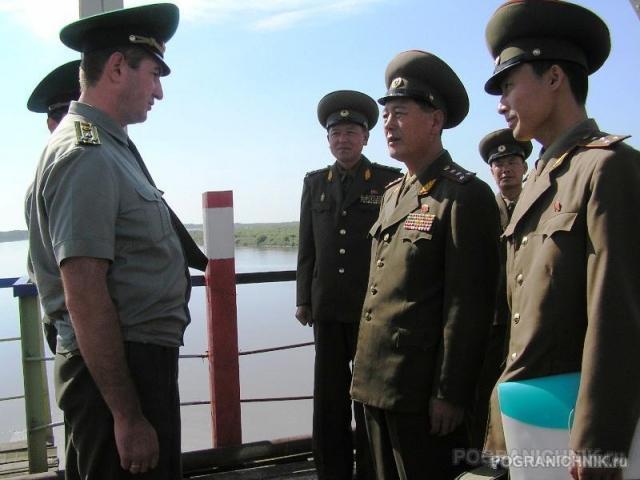
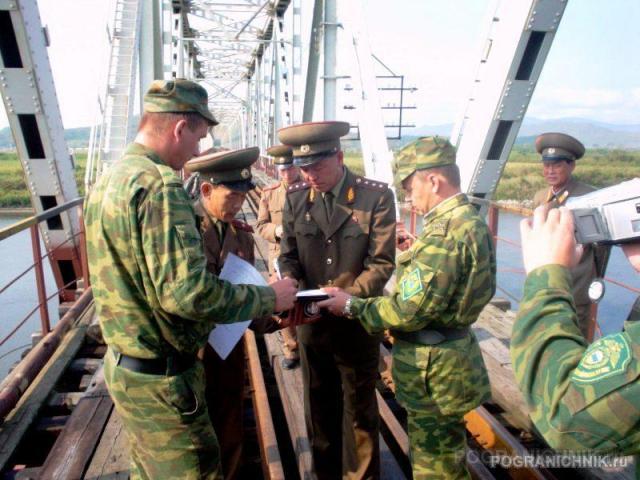
Source:
http://forum.pogranichnik.ru/index.php/gallery/image/5413-khasanskii-pogo-kndr-vstrecha-delegatcii
http://forum.pogranichnik.ru/index.php/gallery/image/5408-khasanskii-pogo-kndr-peredacha-ngg/
Continue
MY OTHER TRIPS
Eurasia 2005: ~35.000 km by train from Europe via Ukraine, Russia and Mongolia to China and back to Europe via Kazakhstan and Uzbekistan:
http://eurasia2005.blogspot.com/
Total solar eclipse 2008: Trip to the total solar eclipse in the Altay mountains (1st august 2008), including a 6-day trekking trip:
http://zatmenie2008.blogspot.com/
excellent information... thanks guys ... i'm really curious about bordelines.... greetings from Miami, Florida, U.S.A.
ReplyDeleteThank you for posting this excellent travelogue full of photos. What an exciting route! I lived in Asia for 8 years but never made it that far north.
ReplyDeleteI became interested in travel to North Korea after reading a mystery novel set in that country (http://www.amazon.com/Corpse-Koryo-James-Church/dp/0312352085). You might want to check it out!
Cheers,
Jennifer from Montreal, Canada
Dear Helmut. Thanks for your post, I have seen it with the great pleasure, but you have a mistake in the name of the river.
ReplyDeleteIn comments to photos where you write "Punctually at 9:05 (16:05 local time) train 966 left. The train uses the Transsiberian main line along the Ussuriy-river for the first kilometres…", You have incorrectly informed on the name of the river which is represented in a photo.
The name of this river in the Chinese language is "Sjuj Fyn" and in Russian is "Razdol'naya river".
The river Sjuj Fyn begins near to the Chinese city "Sjuj Fyn He" it locatetd near the Russian Border. And this river runs into "Amurski" bay, which forms a part of sea of Japan.
@Kirill: Thanks for the information, I've already corrected the mistake.
ReplyDeleteOh wow this is absolutely amazing! I too stumbled upon this blog because I'm curious about these borderlines. You guys were so brave for doing this! Greetings from London, U.K.
ReplyDeleteI will not be able to sleep tonight thinking about the fate that befell that young DPRK man who is being transferred to the Korean guards.
ReplyDeleteDear Helmut. Thanks for an interesting article on the border area. I must read up on why the border between the three countries is where it is. When I visited the U.S. Mexican border area, I saw poor young Mexican men who were aprehended by U.S. border guards and had their hands tied with electrical cable ties. And this was in an area which was taken from Mexico by military force. They looked equally miserable. Regards. Robert.
ReplyDeleteIn 2007 I was at the 3 country border on the Chinese side. There was a public observation tower there, from where I had a good look across at Khasan and wondered if I would ever be able to go there!
ReplyDeletewow, an amazing read, have always been fascinated by the border between these 3 countries and was really interesting reading an account of the border that wasn't from an "official news outlet" of some sort.
ReplyDeleteDear Friend
ReplyDeletewhat a wonderful trip. What wonderful description ! I was most charmed with your blog. I am a train travel lover.
Thank you very much !
Andrei Nicolau
Bucharest, Romania
www.tours-of-romania.com
thanks mate, interesting read!
ReplyDeleteHi! i was just wondering which languages you speak?
ReplyDeleteSurely you must have known a fair bit of russian to explain things?
thanks!
Your blog is really exiting btw.
Hi, yes I speak Russian (beside German, English and a little bit Italian). Thanks for your feedback!
ReplyDeleteThanks for this post! Excellent read. Quite a beautiful place really.. So weird that govts work together to build all the rail and support systems. Then turn around hinder people from using it..
ReplyDeleteHi there! Good stuff. I am living in Vladivostok and want to head down to Khasan, but am having trouble finding a way to get there. I am thinking of trying to find a bus from Ussurisk, but so far don't know if it's possible. Do you have any advice?
ReplyDeleteThanks,
Miles
An absolutely amazing read. Great detail, great pictures. To me, North Korea has always been that uncharted territory on the map that keeps bothering me and must be experienced first-hand once in a lifetime. I envy you for this adventure.
ReplyDeleteThank you!
An absolutely amazing read. Great detail, great pictures. To me, North Korea has always been that uncharted territory on the map that keeps bothering me and must be experienced first-hand once in a lifetime. I envy you for this adventure.
ReplyDeleteThank you!
awesome blog i read all off it
ReplyDeleteGreat read guys!! Thanks for sharing!! Virginia, USA
ReplyDeletean interesting read thanks for sharing
ReplyDeleteIts amazing! Thank you for sharing. Greetings from Malaysia.
ReplyDeleteNow this sleeping car from MOSCOW to PYONGYANG is history, as I found out.
ReplyDeletePlease read my report (in German language) on
globetrotter.org
click to "FORUM"
then "Infos austauschen"
then my name ULI
report "SIBIRIEN Trans-Sib" June1914
Good and useful information.
ReplyDeleteCan you reupload the broken pictures?
ReplyDeleteMissing photos shouzld be visible again now!
ReplyDeleteWhat a bunch of guilful cowards these russians doing business with North Korea in these special zones and handing over refugees to let them die in concentration camps. Russions stand up against this shameful businesses.
ReplyDelete